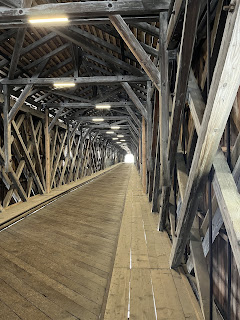Morning found me at a self-service hotel buffet, with the only staff in sight restocking and clearing away - low-paid staff are clearly kept to a minimum in Liechtenstein. But I had plans. First, a walk down to the river, stopping at the Rhinepark Stadion, home of the mighty FC Vaduz and the not-so-mighty Liechtenstein national football team, before heading for the Altebrucke, a wooden covered bridge spanning the Rhine. It would have been churlish not to walk to Switzerland and I didn’t hesitate to cross. Then on to Triesen to catch a bus to the southernmost community in the country, Balzers.

I hadn’t planned anything in Balzers but, as the bus approached, I spotted Schloss Gutenberg, built on a 70 metre tall rock on the edge of the town. It’s one of only two castles in the country, and was restored by a local architect at the turn of the last century before being purchased by the Government for use as a banqueting and conference venue, and is only reachable via a steep single-track cobbled road. And, whilst the castle itself isn’t open for public viewing, you can get into the garden in front of it.
I needed a drink after that climb and, most conveniently, at the bottom of the hill was a converted old American yellow school bus, serving burgers and local beer. I didn’t hesitate…
Back to Vaduz, and time to visit the Post Museum. There’s something about small countries and stamps, and Liechtenstein is no exception. You do get a free bookmark with your admission, and the stamps are interesting enough, if you like that sort of thing. The Art Museum is pretty spectacular though but then, when the ruling Prince is worth around €5 billion and has his own art collection, you perhaps shouldn’t be surprised that it’s rather good. The guest exhibit was somewhat quirky, courtesy of a Brazilian installation artist called Rivane Neuenschwander. The room full of dripping buckets was actually better than it sounds, and the “help yourself to an inspirational ribbon” was interesting, if somewhat alien to the normally orderly locals.
Vaduz has one of those slightly absurd land trains. But it was free, and I was intrigued to see what treats it might include. There was a lot of alpine music, and quite a lot of history, but little to lead you to believe that Vaduz is the sort of place that excites much. If you’ve got forty-five minutes to kill, it’s no worse than walking, but I wouldn’t suggest building your day of touristic activity around it.
I needed dinner and, for all of Vaduz’s charm, it isn’t price conscious. Ros had mentioned that she’d rather liked Feldkirch, across the Austrian border. And I just had time to get to Switzerland to catch the train… The somewhat occasional Buchs to Feldkirch service supplies Liechtenstein with its only scheduled train service and so I can now authoritatively claim that I have ridden the entire Liechtenstein rail network.
And Feldkirch did seem quite nice, at least what I got to see of it. The schnitzel was certainly worth the journey, although I deeply suspect that serving bad schnitzel is a criminal offence in Austria…
That left me with the task of getting back to my hotel, which is where the tri-national route 11 bus comes in. This leaves Feldkirch and runs the full length of Liechtenstein, via Schaan, Vaduz and Balzers, before ending its journey in Sargans, over the border in Switzerland, where you can connect to trains further into the country. And it’s a pretty ride too…
I got an early night, for I had an early start the next morning…



Clearly an avant garde artist if their name is (insert here).
ReplyDeleteThat'll teach me to check the draft before I publish it. Mind you, (insert later) might be a pretty good name for an avantgarde artist...
ReplyDelete